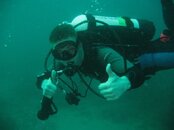Deefstes
Contributor
- Messages
- 1,396
- Reaction score
- 49
- # of dives
- 100 - 199
Hi all, I'm asking this question here because I know there are cave divers and wreck divers who frequent these forums. I'm not asking because I'm planning on engaging in either any time soon, I'm really just curious so please don't give me the standard "take the course" answer
From some discussions with other divers I got the impression that there is a distinct difference between cave divers and wreck divers. And it seems to be more than just the different techniques used in the different environments (although I'm interested to hear about that too) but some divers are wreck divers and not cave divers while others are cave divers and not wreck divers.
I've always thought of cave and wreck diving as "penetration diving", not recognising that they are different. Enlighten me please?
Are there different courses for the different types of penetration diving? What are the techniques and equipment that one uses and the other doesn't?
From some discussions with other divers I got the impression that there is a distinct difference between cave divers and wreck divers. And it seems to be more than just the different techniques used in the different environments (although I'm interested to hear about that too) but some divers are wreck divers and not cave divers while others are cave divers and not wreck divers.
I've always thought of cave and wreck diving as "penetration diving", not recognising that they are different. Enlighten me please?
Are there different courses for the different types of penetration diving? What are the techniques and equipment that one uses and the other doesn't?






